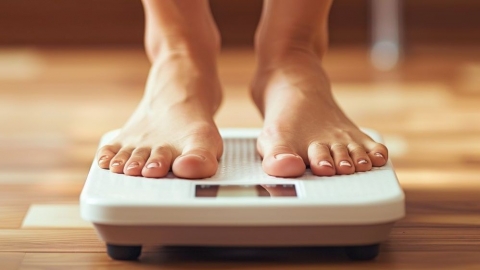Why does weight increase on the first day of menstruation?
"Yima" usually refers to menstruation. Weight gain on the first day of menstruation may be caused by hormonal changes, dietary factors, premenstrual syndrome (PMS), hypothyroidism, or ovarian dysfunction. This can be improved through dietary adjustments, moderate exercise, and medical interventions. If there are abnormal weight fluctuations or severe symptoms such as edema and fatigue, prompt medical attention is recommended.
1. Hormonal changes: Fluctuations in estrogen and progesterone during menstruation cause the body to retain water, leading to edema and weight gain, often accompanied by swelling in the hands and feet. It is recommended to reduce salt intake, consume more diuretic foods like winter melon, and drink 1500–2000 mL of warm water daily.
2. Dietary factors: Consuming pickled or processed foods before or during menstruation increases sodium intake, worsening water and sodium retention, which can lead to weight gain and possibly thirst. A light diet is recommended, using natural seasonings instead of salt, and avoiding high-salt snacks.

3. Premenstrual syndrome (PMS): Hormonal changes before and during menstruation can cause physical discomfort. Besides weight gain, symptoms may include breast tenderness and mood swings. Under medical guidance, medications such as vitamin B6 tablets, spironolactone tablets, and ibuprofen sustained-release capsules may be used to relieve symptoms.
4. Hypothyroidism: Insufficient thyroid hormone secretion slows metabolism, making weight gain more likely during menstruation. Symptoms may also include cold intolerance, fatigue, and menstrual irregularities. Under medical supervision, medications such as levothyroxine sodium tablets, thyroid tablets, and vitamin D drops may be used to improve symptoms.
5. Ovarian dysfunction: Hormonal imbalances due to ovarian issues affect metabolism, increasing the likelihood of weight gain during menstruation. This may be accompanied by irregular menstrual cycles and abnormal menstrual flow. Medications such as progesterone capsules, estradiol tablets, and drospirenone-ethinyl estradiol tablets should be taken under medical guidance to manage symptoms.
Maintaining a light diet with reduced salt intake, engaging in mild physical activities such as walking to promote circulation, and ensuring adequate sleep while avoiding late nights can help regulate bodily functions and alleviate weight fluctuations.








